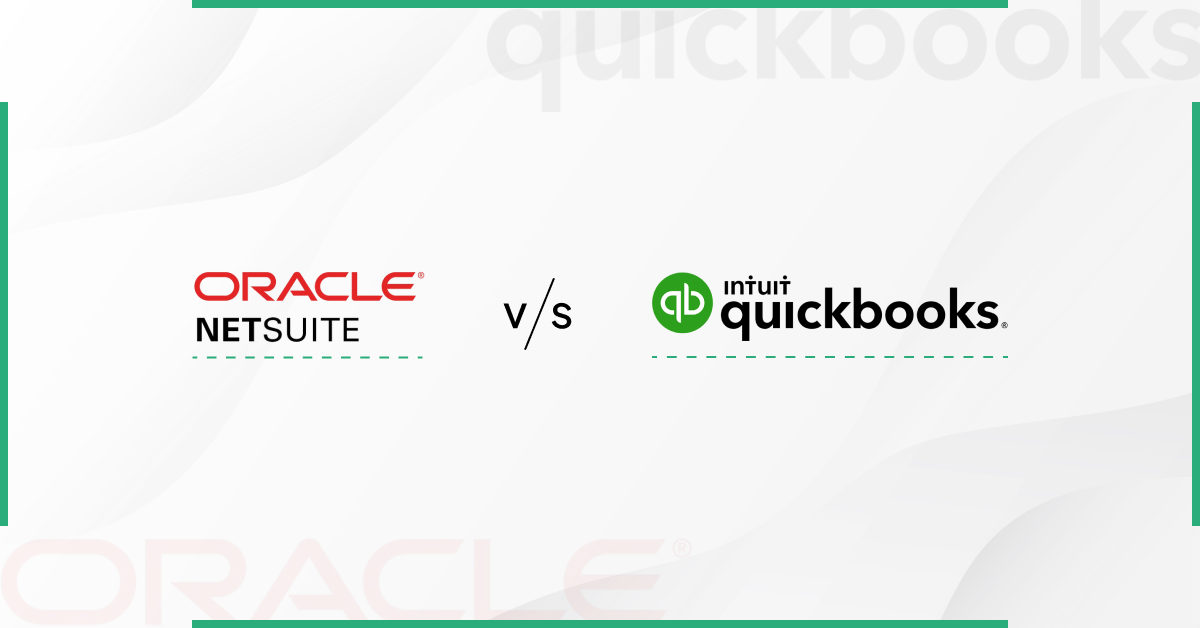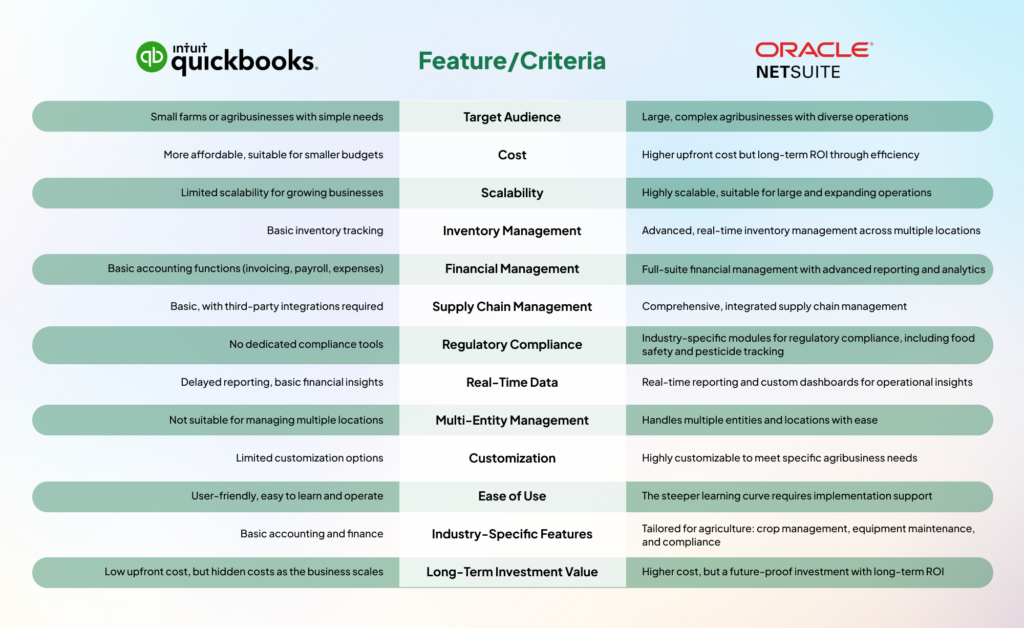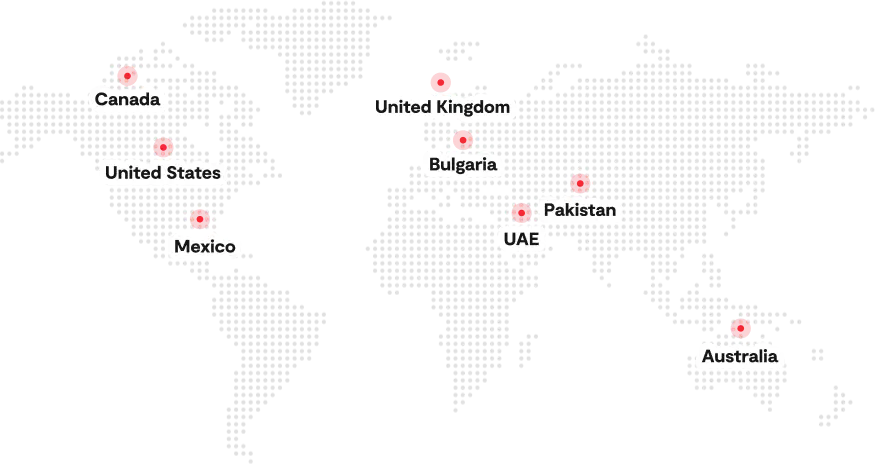The agriculture industry has evolved drastically in recent years, with technology playing an increasingly vital role in managing everything from crop production to livestock, supply chains, and regulatory compliance. As agribusinesses scale up and grow more complex, relying on basic accounting software like QuickBooks can leave operations vulnerable to inefficiencies.
On the other hand, Enterprise Resource Planning (ERP) systems like NetSuite offer more robust solutions designed to address the multifaceted needs of modern agribusinesses. In this blog, we’ll compare NetSuite and QuickBooks, two popular software solutions, to determine which is better suited for complex agricultural operations.
Why do Modern Agribusinesses Need ERP Systems?
Agriculture is no longer just about planting seeds and harvesting crops. Today’s agribusinesses face various challenges that require integrated ERP solutions for agriculture to optimize performance, ensure compliance, and keep up with industry changes. These challenges include:
Unique Challenges
- Managing Diverse Resources: Farms today operate more than just crops. They juggle livestock, equipment, labor, and other resources that must be tracked and optimized across multiple locations.
- Regulatory Compliance and Food Safety: Agribusinesses must adhere to various regulations, including those related to food safety, pesticide use, labor laws, and environmental practices. Failing to stay compliant can result in costly fines, legal trouble, or damage to a company’s reputation.
- Tracking Financials and Inventory Across Multiple Locations: For larger agribusinesses that operate across multiple farms or regions, monitoring financials, inventories, and resources manually or with disjointed systems becomes cumbersome and error-prone.
Impact of Inefficient Tools
- Delays in Decision-Making: Using fragmented or basic systems leads to delays in accessing real-time information, significantly impacting decision-making.
- Inefficiencies in Inventory and Resource Management: Agribusinesses need an integrated system to avoid overstocking, understocking, or mismanaging resources, which can lead to wasted time and money.
Overview of NetSuite and QuickBooks
When choosing the right agriculture accounting software, it’s crucial to understand how NetSuite and QuickBooks fit into the agricultural industry. Both are popular tools in the business world, but they serve different needs depending on the scale and complexity of your operations.
In this section, let’s take a look at each tool’s role:
What is QuickBooks? – QuickBooks Overview
QuickBooks is one of the most widely used accounting software solutions, known for its simplicity and affordability. While it is predominantly designed for small businesses, it can still play a key role in the agricultural sector, particularly for farms or agribusinesses with basic financial management needs.
QuickBooks is most effective in the agriculture industry for small-scale farms or businesses looking to manage essential financial tasks like invoicing, tracking expenses, and payroll. Its ease of use makes it an appealing choice for agricultural businesses that still need to require the full capabilities of an ERP system.
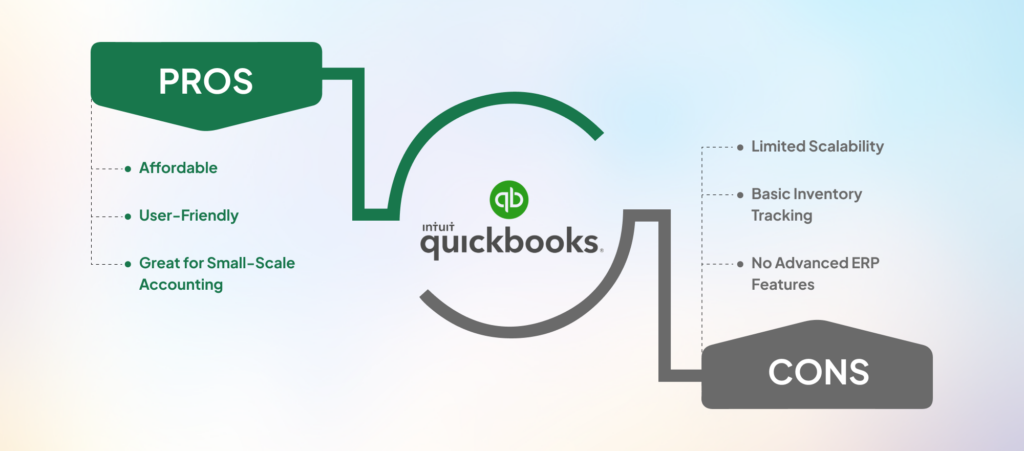
Pros
- Affordable: QuickBooks offers an affordable solution for small farms or agribusinesses just starting. Its cost-effectiveness is one of its strongest selling points.
- User-Friendly: Designed with simplicity in mind, QuickBooks is easy to learn and use, even for those without a background in accounting. This is a key benefit for farmers who may need formal accounting expertise.
- Great for Small-Scale Accounting: QuickBooks excels in handling basic accounting needs, making it ideal accounting software for small agricultural businesses that only need to manage finances and track basic transactions like income, expenses, and taxes.
Cons
- Limited Scalability: QuickBooks may show limitations as your farm or agribusiness grows. It needs help to handle the complexity of larger operations with multiple locations or more intricate financial tracking needs.
- Basic Inventory Tracking: While QuickBooks offers essential inventory management, it needs advanced tracking features to manage more extensive or diverse inventories of agricultural products, equipment, and supplies.
- No Advanced ERP Features: QuickBooks is primarily an accounting tool, not a full-fledged ERP system. It doesn’t offer integrated solutions for managing other crucial aspects of agribusiness, such as supply chain management, procurement, or crop management.
What is NetSuite? – NetSuite Overview
On the other hand, NetSuite is a comprehensive cloud-based ERP solution tailored to the needs of larger, more complex businesses. It offers a broad range of features that make it particularly useful for agribusinesses that operate on a larger scale or require a more integrated system.
NetSuite for agriculture is an all-in-one solution, from crop management to supply chain optimization and regulatory compliance. With its extensive modules designed specifically for agriculture, NetSuite helps businesses integrate all their operations into one platform, providing a more streamlined and efficient approach.
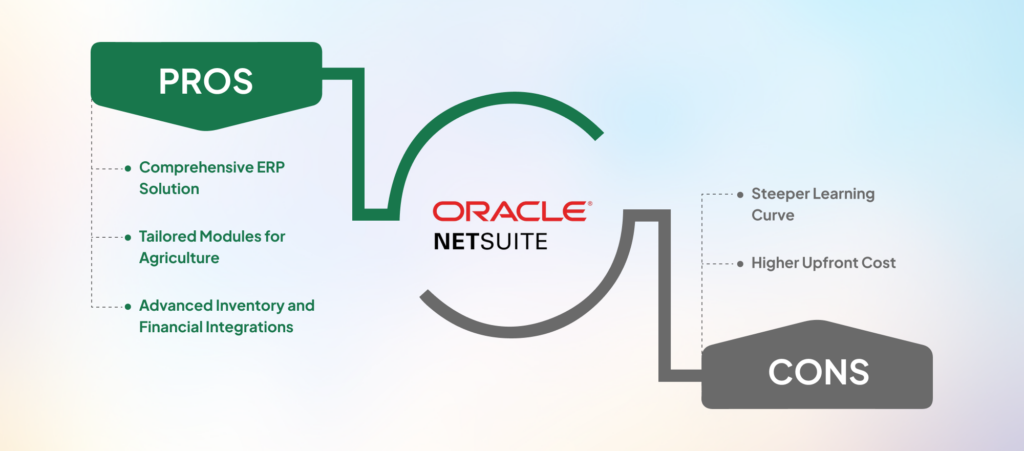
Pros
- Comprehensive ERP Solution: Unlike QuickBooks, NetSuite provides a full suite of ERP features, including financial management, inventory control, procurement, customer relationship management, and more. This makes it a one-stop shop for all aspects of agribusiness.
- Tailored Modules for Agriculture: NetSuite offers industry-specific modules for managing crops, livestock, equipment, and compliance with regulations. These tools help agribusinesses optimize operations and meet food safety standards and other industry requirements.
- Advanced Inventory and Financial Integrations: With advanced inventory management and financial tracking capabilities, NetSuite provides real-time insights into stock levels, procurement needs, and economic performance. This is crucial for agribusinesses with extensive inventories or multiple locations.
Cons
- Higher Upfront Cost: One of NetSuite’s primary downsides is its higher initial investment, which may be a barrier for smaller agribusinesses with limited budgets.
- Steeper Learning Curve: Due to its comprehensive features and customization options, NetSuite can be more difficult to implement and learn than more straightforward tools like QuickBooks. Businesses need a dedicated team or consultant to help with setup and training.
Advantages of NetSuite Over QuickBooks for the Agriculture Industry
When managing complex agricultural operations, the choice between NetSuite and QuickBooks becomes clear. While QuickBooks may serve well for small-scale, straightforward farming operations, NetSuite offers significant advantages for larger, more intricate agricultural businesses.
Here, we’ll explore NetSuite’s specific advantages over QuickBooks, particularly in the agriculture industry.
1. Real-Time Reporting
- NetSuite: NetSuite provides custom dashboards that enable real-time monitoring of critical agricultural metrics, such as crop yields, weather impact, and financial performance. This data management allows farm managers to make quick, data-driven decisions and adjust operations accordingly.
- QuickBooks: While QuickBooks offers reporting features, its capabilities are delayed and basic. It is not designed for complex, real-time agricultural analysis, which can result in missed opportunities for timely adjustments on the farm.
2. Integrated Financial and Inventory Management
- NetSuite: NetSuite integrates accounting, procurement, and inventory management into a unified system, providing a complete view of farm operations. It supports multi-location tracking, helping manage resources efficiently across multiple farm sites with real-time inventory and financial status updates.
- QuickBooks: QuickBooks operates with disjointed modules. While it offers essential financial management tools, it needs a comprehensive inventory and supply chain management system. Its functionality can limit farms dealing with complex operations and varying product types.
3. Scalability and Multi-Entity Management
- NetSuite: NetSuite is designed for scalability, making it the perfect solution for growing agricultural businesses that manage multiple farms, production facilities, and global operations. It offers robust multi-entity management capabilities, allowing users to manage different farm locations and operational needs from a single platform.
- QuickBooks: QuickBooks is more suited for small, single-location businesses. As agricultural operations expand or become more complex, QuickBooks needs help scaling and managing multiple entities effectively, limiting its utility for larger or rapidly growing farms.
Key NetSuite Features Tailored for Agriculture Businesses
NetSuite provides a robust suite of features specifically designed to meet the unique needs of agricultural businesses. It offers a comprehensive solution to optimize operations, enhance efficiency, and ensure compliance across all areas of the farm business.
Using NetSuite’s industry-tailored modules and features, agricultural businesses can gain control over their operations, reduce costs, and ensure compliance while increasing overall efficiency and productivity.
1. Industry-Specific Modules for Agricultural Operations
- Crop Management: NetSuite’s crop management tools enable farmers to track planting schedules, monitor growth cycles, manage harvest timelines, and analyze crop performance. From seed to sale, these modules ensure that agribusinesses can manage operations effectively and make informed decisions at every stage of the farming process.
- Equipment Maintenance: NetSuite’s equipment management tools help you avoid machinery downtime by tracking equipment usage, maintenance schedules, and repairs. Regular maintenance and proactive management ensure that critical machinery is always ready for use, minimizing disruptions in operations.
- Regulatory Compliance: NetSuite simplifies regulatory compliance by integrating tools that help track pesticide usage, labor practices, and industry certifications. These features ensure adherence to the agriculture sector’s complex environmental and food safety regulations.
2. Efficient Supply Chain Efficiency with NetSuite
NetSuite offers a set of automated workflows designed to optimize the entire supply chain. These features seamlessly enhance operational efficiency, from order processing and inventory management to product distribution. Whether managing customer orders, vendor relationships, or final product delivery, NetSuite ensures that every supply chain step is smooth, transparent, and efficient.
3. Simplified Regulatory Compliance for Agricultural Businesses
Staying compliant with agriculture-specific regulations is crucial, and NetSuite’s built-in tools make it easier to track certifications, manage audits, and fulfill reporting requirements. Whether dealing with food safety, labor laws, or pesticide regulations, NetSuite helps agribusinesses stay on top of compliance and avoid costly penalties.
Addressing the Cost Factor – Is investing in NetSuite for Agribusinesses Justified?
When evaluating software solutions for agricultural businesses, the cost is often one of the first factors to consider. While NetSuite offers a comprehensive suite of tools and features, its upfront investment can appear daunting, especially for smaller agribusinesses with tight budgets.
However, it’s essential to assess the long-term benefits and return on investment (ROI) that NetSuite can provide compared to more basic software options like QuickBooks.
NetSuite Investment Justification – It is A Long-Term ROI
1. High ROI through Improved Efficiency
NetSuite is designed to streamline business operations, from crop management to inventory control, regulatory compliance, and supply chain optimization. By automating manual tasks and integrating various aspects of agribusiness, NetSuite can significantly reduce the time and resources spent on daily operations. The increased efficiency leads to better use of labor, fewer errors, and a faster time-to-market for products—translating into higher profitability over time.
2. Waste Reduction
Waste reduction is one of the most significant areas in which NetSuite provides value. With real-time data tracking, predictive analytics, and robust inventory management capabilities, NetSuite helps agribusinesses minimize crop, equipment, and labor waste. Whether preventing spoilage by tracking crop yields and weather patterns, reducing overstocked inventory, or avoiding unnecessary labor costs, NetSuite enables more intelligent decision-making that directly reduces waste and drives costs.
3. Better Financial Oversight and Decision-Making
NetSuite offers advanced financial management features, including real-time reporting, multi-entity management, and detailed analytics, which empower businesses to track costs more accurately and optimize spending. By accessing comprehensive financial data at their fingertips, agribusiness owners can make better decisions that directly contribute to long-term profitability and growth.
QuickBooks Affordability Caveat – Hidden Costs in the Long Run
While QuickBooks may initially seem affordable, it has a range of hidden costs that can make it less economical for growing agribusinesses in the long term.
1. Limited Scalability and Growing Costs
QuickBooks is designed primarily for small businesses and needs more scalability for more extensive agribusiness operations. As a company grows, QuickBooks often requires additional third-party apps or integrations to manage complex operations like multi-location inventory management or sophisticated supply chain processes. These add-ons come with additional subscription fees, which can quickly add up, making the total cost of ownership higher than initially anticipated.
2. Increased Operational Complexity
As an agribusiness expands, managing multiple systems (QuickBooks plus various third-party apps) can lead to operational inefficiencies and increased complexity. A centralized platform is necessary for agribusiness owners and staff to spend time and effort switching between different tools, which can lead to errors, missed opportunities, and wasted resources, ultimately eroding profitability.
Long-Term Benefits of NetSuite vs. QuickBooks
When choosing between NetSuite and QuickBooks for your agricultural business, it’s essential to consider the immediate functionalities and the long-term benefits each platform offers. As your business grows, these systems’ scalability, integration capabilities, and advanced features will play a critical role in shaping your future success.
Let’s explore how NetSuite and QuickBooks stack up over time, highlighting their impact on efficiency, profitability, and long-term sustainability in complex agricultural operations.
1. Future-Proof Investment
As an agribusiness grows, so does the need for more sophisticated software. NetSuite’s comprehensive suite is designed to scale with businesses of all sizes, supporting complex needs as the business expands globally or diversifies into new areas. This scalability makes it a future-proof investment that grows with the company. In contrast, QuickBooks’ lack of scalability may require an eventual migration to a more robust solution, adding to the cost in both time and money.
2. Greater Control Over Business Operations
With NetSuite, agribusinesses gain better control over their operations. It allows them to streamline tasks, monitor KPIs in real time, and optimize every aspect of the supply chain. The ability to easily access integrated data from every part of the business improves operational performance and enhances strategic decision-making.
Final Recommendation
Choosing QuickBooks and NetSuite depends on your agribusiness’s specific needs, size, and growth potential. Both solutions offer valuable features, but the decision ultimately hinges on scalability, complexity, and long-term business goals.
When to Choose QuickBooks?
QuickBooks can be an excellent option for smaller agribusinesses with straightforward accounting needs. It’s well-suited for businesses that:
- Are Just Starting or Smaller in Size: QuickBooks offers a cost-effective solution to manage accounting and basic reporting if your agribusiness is just beginning and doesn’t require complex financial management or scalability.
- Have Simpler Operational Needs: QuickBooks works well for businesses that don’t need intricate supply chain management, multi-location operations, or advanced data analysis. QuickBooks can get the job done if your operations are small and localized.
- Need Quick Setup and Ease of Use: QuickBooks offers an intuitive interface, making it ideal for businesses without dedicated IT support or needing advanced customization. If you need a straightforward, easy-to-use solution to handle your essential accounting functions, QuickBooks provides a simple, accessible entry point.
When to Choose NetSuite?
NetSuite is the superior option for agribusinesses growing or aiming for significant expansion. It is ideal for businesses that:
- Have Complex, Multi-Entity Operations: If your agribusiness operates across multiple locations, regions, or countries, NetSuite’s ability to manage multi-entity financials and supply chain operations makes it the ideal solution. NetSuite’s centralized platform can seamlessly handle operations at scale, saving time and reducing errors.
- Require Robust Supply Chain and Inventory Management: For businesses with complex inventory, crop tracking, or equipment management needs, NetSuite provides advanced features to manage everything from seed to sale, including predictive analytics and real-time monitoring to optimize stock levels and reduce waste.
- Need Scalability for Future Growth: NetSuite is designed to scale as your business grows. Whether you are expanding your operations, diversifying your product offerings, or moving into international markets, NetSuite can handle complex demands and grow your business.
- Prioritize Real-Time Data and Decision-Making: NetSuite offers real-time analytics, custom dashboards, and detailed reporting, which are essential for making informed decisions quickly and efficiently. NetSuite is the best choice if your agribusiness needs real-time insights to adapt to changing conditions, such as crop yields, weather patterns, or market demands.
- Focus on Regulatory Compliance and Industry-Specific Needs: With tools tailored to agricultural regulations and standards (such as pesticide tracking and labor compliance), NetSuite is well-suited for businesses in regulated industries that need to maintain up-to-date certifications and audit trails.
Comparison Between QuickBooks and NetSuite
Here’s a comparison chart between QuickBooks and NetSuite for complex farm operations:
Conclusion
Choose QuickBooks if your agribusiness is small, just starting, or has simple operational needs. It’s a budget-friendly, user-friendly solution that covers basic accounting and financial management.
Opt for NetSuite if your business is growing, requires advanced functionality, and is ready to invest in long-term scalability, real-time insights, and comprehensive supply chain management. NetSuite offers the tools to optimize every aspect of your business, ensuring efficiency and profitability as you scale.
If you’re looking to make the most of NetSuite’s full potential for your farm operations, Folio3 is here to help. As experts in NetSuite implementation, we specialize in tailoring solutions that fit your specific needs, ensuring that you get the most out of your investment. Our team provides ongoing support to smooth the transition and help you unlock the long-term benefits of a unified, scalable ERP system.

